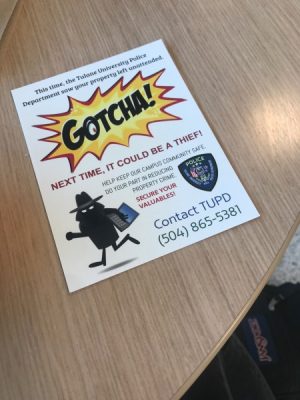TUPD’s ‘Gotcha’ program wastes resources, belittles students
November 27, 2019
After deciding to take a quick break from studying in Howard-Tilton Memorial Library, you stand in line at the PJ’s Coffee on the first floor. Your belongings? You left them in your cubicle on the third floor, vulnerable to simple theft.

A Gotcha slip is placed on a table next to a student’s unoccupied belongings.
The Tulane University Police Department’s year-old “Gotcha!” program was implemented to reduce instances of petty theft and generally involves several officers patrolling the library seeking out abandoned belongings.
“If an officer observes unattended property, they will attempt to locate the owner and make them aware of the risk of leaving property unattended,” TUPD Police Chief Kirk Bouyelas said. “If the officer cannot locate the owner, they leave a ‘Gotcha!’ card. The card contains safety tips to combat theft.”
These “Gotcha!” warnings, however, are more of a nuisance than a productive use of campus law enforcement.
Imagine stepping away from your workstation, leaving a few notebooks and your backpack out near the desk, to retrieve your essay from the printer. You have your eye on your belongings the entire time — you even see the trio of TUPD officers approach your things.
“Coffee With a Cop” or “Pizza With the Police”? #Tulane campus police, students team up for safety: https://t.co/9nlf1Bm1CU @TulanePolice pic.twitter.com/2qPUuDtnhg
— Tulane University (@Tulane) October 12, 2017
But what are you going to do, shout to an officer across the Learning Commons that you are, in fact, watching your property? You return to your desk in defeat, shamefully reading about how you should memorize your laptop’s serial number, make and model.
Sometimes “Gotcha!” cops hover around the belongings until the “victim” returns. Then they will berate this person, reciting the information on the card. Are Tulane students this desperately in need of common-sense personal safety lessons?
TUPD holds that stepping away from valuables for even a few seconds presents an opportunity for theft and that Tulane students could benefit from a few crime prevention tips.
Still, the program feels paternalistic. Hand-holding is pervasive at Tulane, but the reality is that students must learn to deal with the consequences of theft and prepare for a future where they won’t have a private police department looking after them.
Ultimately, TUPD has been unable to confirm if “Gotcha!” cards have been effective, but the program has succeeded in making students feel intimidated and interrupted.
“While there is no empirical evidence to suggest that the Gotcha cards have reduced theft alone, property theft has been reduced this year,” Bouyelas said. “That reduction is likely the result of several initiatives, to include the Gotcha cards.”
Whether or not the program is successful, it should be revised so that cards are only distributed in instances where the owner has truly left their belongings unattended.
Earlier this month, there were two alleged sexual assaults at @thebootnola. @Loyola_NOLA/@Tulane police, @NOPDNews investigated. The suspect arrested today was connected to a THIRD incident. @wdsu @ShermanDesselle reported on the other allegations: https://t.co/WoQ6GJpf3j
— Christina Watkins (@CWatkinsWDSU) September 22, 2019
TUPD could spend its time more efficiently if the program would stop assigning officers “Gotcha” duty and instead placed signs around common spaces reminding students to look after their valuables. This change would free up the department’s time and resources that could be allocated instead to more pressing issues such as sexual assault.
Tulane is fortunate to have its police department. Still, there’s something both unsettling and comical about uniformed police officers marching through the library, handing out cards adorned with a cartoon thief warning adult students to watch their belongings.





















student2 • Nov 30, 2019 at 10:50 pm
There is definitely research that backs up the use of “Gotcha” cards. It’s acts as a deterrence so the fact that the policy moved you enough for you to write about it makes it seem like it’s working.
student • Nov 30, 2019 at 1:57 pm
This is a silly article attacking a practice that is logically based in benevolence. Burglary and robbery are some of Tulane’s largest issues, please refer to https://publicsafety.tulane.edu/sites/publicsafety.tulane.edu/files/ASR_Clery_v04_0.pdf. The practice may at first glance seem silly until you do your research or your laptop is stolen because of negligence.